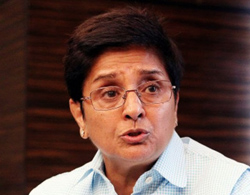New Delhi, Feb 7: AAP today filed a complaint against BJP's chief ministerial candidate Kiran Bedi with the Election Commission over an alleged violation of the Model Code of Conduct in her constituency, Krishna Nagar.
In its letter to the poll watchdog, AAP accused Bedi of holding a road show and a bike rally this morning with hundreds of workers carrying "campaign material" and "talking to voters".
Campaigning for the Delhi polls had closed officially on Feb. 5 at 6 P.M. "Kiran Bedi from Krishna Nagar constituency doing 'padyatra'- bike rally with hundreds of workers and met with voters. Hundreds of workers with campaign material. She did 5 KM padyatra and bike rally," the letter said.
The party alleged that the rally was held inside the main Krishna Nagar area and urged EC to take action against Bedi.
The complaint by the party came even as AAP convener Arvind Kejriwal sought EC's intervention over polling being "slowed down" in many places, which he said had resulted in voters returning without casting their vote.
"As per rules, 3 voters r allowed inside booth at a time. They r allowing only 1 voter, which has slowed down voting... Even lunch breaks being taken which is against rules. EC shud (sic) immediately intervene," he tweeted.
Earlier, Kejriwal had urged people to not vote for the parties who have "distributed alcohol and money".
He had also taken a dig at BJP President Amit Shah's recent statement that the Prime Minister's promise to deposit Rs 15 lakh in bank account of every family after recovering black money stashed away abroad was just an "electoral gimmick (jumla)".
"Don't vote for parties who treat their poll promises as electoral gimmicks. Vote for those who are into honest politics and will eradicate corruption," he had said.





Comments
Add new comment